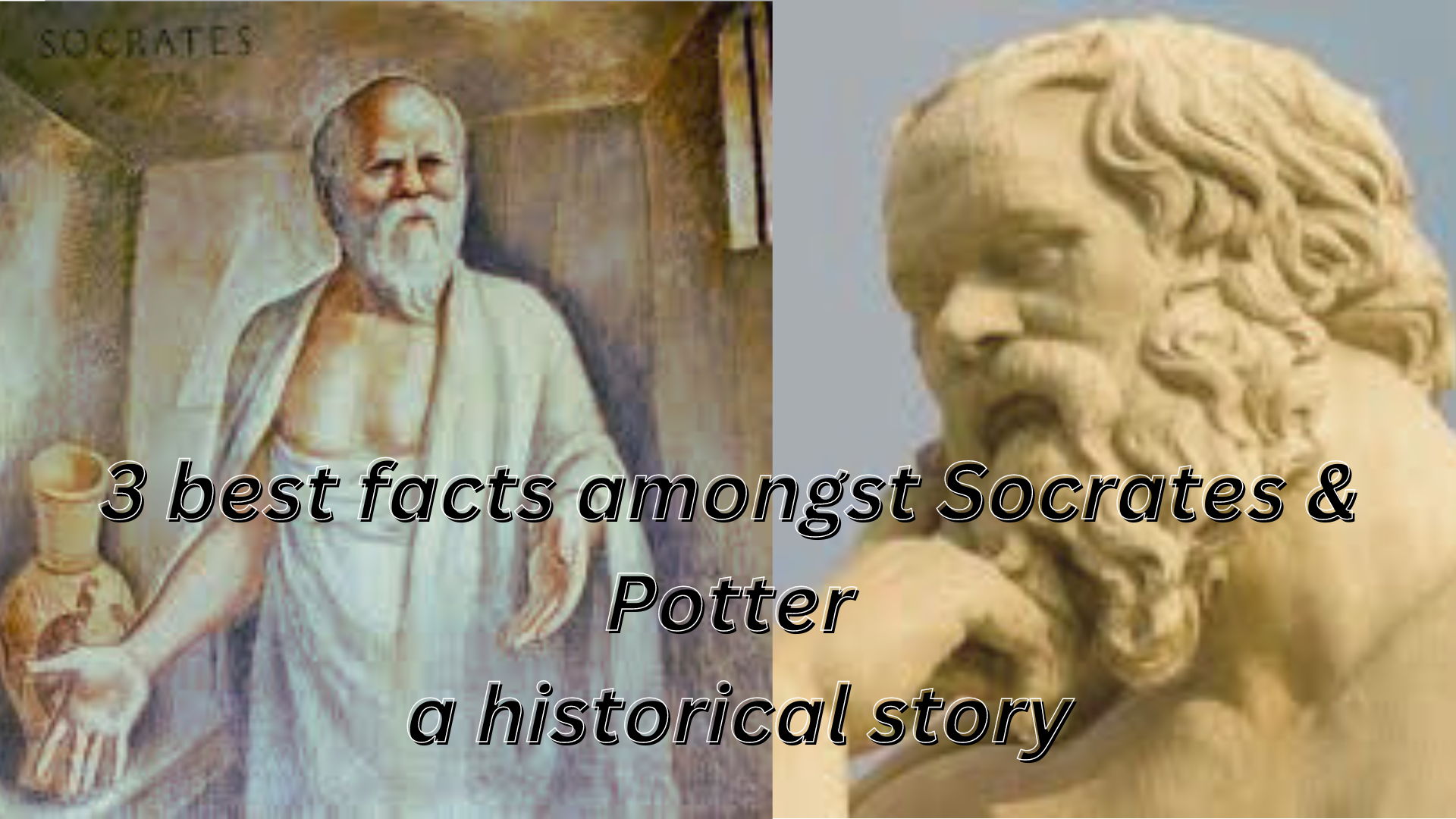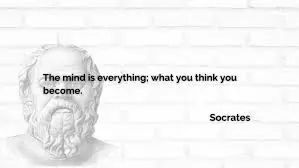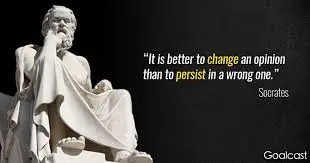Welcome to (International Stories). In this story, we will discuss 3 best facts amongst Socrates & Potter a historical story. I hope you will like this story and understand it.
3 best facts amongst Socrates & Potter a historical story
One of the best write ups
Socrates used to go for a daily walk. There was a potter’s house on this path, who used to make pottery. He used to go to the potter and sit and stare at it intently. It was great to watch him make pottery.
One day, the potter saw his lover, called him and asked, “Son! You pass by everyday and sit beside me and stare, what do you see? ”
Socrates: I see you making vessels and I love watching this process. This made me question a few things. I want to ask you.
Potter: This is a very good thing. You ask whatever questions you would like to.
Socrates: Where is the outline of the utensils you make?
Potter: His outline is the first in my mind.
Hearing this, Socrates spoke with enthusiasm, I understood.
The potter asked surprisingly, what did he understand?
Socrates: That is, everything is created in the thought before creation. This means that in the Creator’s thought we were already created, creation happened later.
Now my next question is, when you are making utensils, so? What do you do to make it so beautiful?
Potter: I make it with love. Whatever I make, I make it with sincerity and use my talents to the fullest so that there is no shortage left.
Socrates said nodding his head in affirmation, he also understood, because the maker loves us, because he made us what we are. The next question is have you been making vessels for so long, someone Wish, what you want to come true.
The Potter : Yes ! Yes. I want to make such a vessel that the world will enjoy and then I can never make such a vessel. The potter said with regret.
Socrates jumped right when he heard this. Wow! Every time the Creator creates such a way that the world wakes up without control, because the Creator knows that the person I am sending into this world, that there will never be another like him.
As your Lord’s noblest creation, you are unique. Your Creator has created you with the best but the best of the Qawwim. Do not waste yourself in vain. Return to your Lord, He has been your way.
Socrates Biography
Socrates was an ancient Greek philosopher who is credited as one of the founders of Western philosophy. He was born circa 470 BCE in Athens and is known for his contributions to ethics and epistemology. Socrates is perhaps most famous for his method of questioning, now known as the Socratic method, which involved rigorous dialogue aimed at eliciting underlying beliefs and assumptions. His teachings often focused on virtue, wisdom, and the pursuit of knowledge through self-examination.
Socrates did not write down his teachings himself; what we know about him primarily comes from the writings of his students, most notably Plato. He gained a reputation in Athens for challenging conventional wisdom and was eventually put on trial in 399 BCE, accused of corrupting the youth and impiety. He was found guilty and sentenced to death, choosing to drink a cup of hemlock rather than flee into exile.
Despite his lack of written works, Socrates’ ideas and methods have had a profound influence on Western philosophy and continue to be studied and debated to this day.
Socrates and his life
Socrates, born around 470 BCE in Athens, lived during a time of great intellectual and political development in Ancient Greece. He came from a humble background; his father, Sophroniscus, was a stonecutter, and his mother, Phaenarete, was a midwife. Despite not being wealthy, Socrates gained access to education and showed early interest in philosophy and the nature of human existence.
Philosophy and Teaching
Socrates did not follow a traditional academic career and did not write down any of his philosophical teachings. Instead, he spent much of his life engaging in public discourse with Athenians from all walks of life. He believed that wisdom begins with recognizing one’s ignorance, and his unique method of questioning—now known as the Socratic method—aimed to reveal contradictions in people’s thoughts, encouraging them to arrive at clearer, more refined conclusions. His topics often revolved around ethics, justice, virtue, and the pursuit of knowledge.
Socrates’ method was based on asking probing questions, fostering critical thinking and self-examination. He engaged politicians, artisans, and ordinary citizens in these discussions, often exposing their ignorance. This approach earned him both admiration and resentment. He had a few prominent students, most notably Plato, who later recorded many of Socrates’ dialogues and philosophical ideas.
Personal Life
Socrates was married to Xanthippe, with whom he had three children. Xanthippe is often portrayed as a difficult and argumentative wife, though historical accounts vary. Socrates himself led a modest lifestyle, caring little for wealth, material possessions, or social status. He spent most of his time discussing philosophy in the streets, public squares, and markets of Athens rather than in classrooms or formal settings.
Trial and Death
In 399 BCE, Socrates was brought to trial by three citizens—Meletus, Anytus, and Lycon—on charges of corrupting the youth of Athens and impiety (not believing in the gods of the city). Athens, having recently endured political upheaval and wars, was in a fragile state, and Socrates’ critical method of questioning authority may have been seen as undermining the stability of the city.
At his trial, Socrates defended himself eloquently, but his argument that he was serving the city by encouraging critical thought was not well received by the jury. He was found guilty and sentenced to death by a slim majority. Instead of fleeing Athens when given the chance, Socrates accepted the verdict, claiming that he must respect the laws of the city. He drank a cup of hemlock poison in the presence of his followers, as described by Plato in his dialogue Phaedo.
Legacy
Socrates’ death left a lasting legacy on Western philosophy. His student Plato, and Plato’s student Aristotle, would go on to shape much of the Western intellectual tradition. Socrates is often regarded as the first moral philosopher, and his method of inquiry laid the groundwork for later debates on ethics, politics, and epistemology. The Socratic method remains a core component of modern education, law, and philosophy.
CONCLUSION:
That’s a beautiful story illustrating deep philosophical insights through a simple exchange between Socrates and the potter. It highlights the concept that creation begins in the mind, emphasizing the importance of intention and love in the creative process.
The idea that each creation, whether a vessel or a person, is unique and made with purpose resonates strongly. It encourages us to appreciate our uniqueness and strive to fulfill our potential. The conclusion to return to our Creator with gratitude and purposeful living is a powerful message.
FAQ:
What is your purpose in life, and how do your thoughts shape your actions?
Just as the potter imagines the vessel before creating it, everything we do begins with a thought. Do you take time to reflect on your intentions and purpose before you act?
Do you put love and sincerity into everything you create or pursue?
The potter reveals that his creations are beautiful because he puts his heart and talent into them. Are you dedicated and passionate about the things you do, no matter how small or big they seem?
Do you recognize your uniqueness and value?
Socrates celebrates the fact that the potter cannot make the same vessel twice. Just as each vessel is unique, each human being is irreplaceable. Do you appreciate and value your unique gifts and qualities, or do you compare yourself to others?
Are you seeking to fulfill your highest potential, or are you content with mediocrity?
The potter dreams of creating a vessel that will astonish the world, yet he hasn’t succeeded. This speaks to the human desire for greatness. Are you striving to live up to your fullest potential, or do you settle for less than what you are capable of?
What is Socrates best known for?
Socrates is best known for being one of the founders of Western philosophy. His contributions lie in his method of questioning, which is now known as the Socratic Method, and his dedication to the pursuit of wisdom and truth. He is also famous for his commitment to ethical living and his belief in the importance of self-examination and questioning one’s beliefs.
His trial and eventual execution for allegedly corrupting the youth and disrespecting the gods of Athens also mark a key moment in philosophical history.
What was Socrates philosophy?
Socrates’ philosophy primarily revolved around ethical inquiry and the pursuit of virtue. He believed that knowledge is the foundation of ethical action, and ignorance is the root of moral wrongdoing. He also held that the “unexamined life is not worth living”, meaning that individuals should constantly question and reflect on their own beliefs and values to live a virtuous life.
Socrates advocated for dialogue and critical thinking, often challenging people’s assumptions and encouraging deeper thinking. He believed that true wisdom comes from recognizing one’s own ignorance.
What are 5 facts about Socrates?
5 Facts about Socrates:
Socrates left no written works: All we know about him comes from the accounts of his students, like Plato and Xenophon.
He was sentenced to death: In 399 BCE, Socrates was condemned to die by drinking hemlock, accused of corrupting the youth and disrespecting the gods.
Socratic Method: Socrates developed a form of cooperative dialogue where he would ask probing questions to stimulate critical thinking and expose contradictions in people’s beliefs.
He lived modestly: Socrates disdained material wealth and focused on intellectual and moral virtues. He lived a simple life in Athens, often walking barefoot and talking to anyone willing to engage in dialogue.
He believed in an inner voice or “daimonion”: Socrates often mentioned a divine inner voice that guided his actions, warning him against doing wrong but never telling him what to do.
What are the three teachings of Socrates?
Know Thyself: Socrates emphasized the importance of self-awareness and introspection. He believed that true wisdom comes from understanding oneself.
Virtue is Knowledge: Socrates argued that to know what is good is to do what is good. Ignorance leads to immoral actions, and those who act wrongly do so because they lack understanding.
The Unexamined Life is Not Worth Living: Socrates believed that individuals should constantly engage in self-examination and reflection, questioning their own beliefs, actions, and motives to lead a meaningful and ethical life.
These teachings continue to influence modern philosophical thought and ethical discussions.



acıbadem elektrikçi SEO çalışmaları sayesinde web sitemizin trafiği katlandı. http://www.royalelektrik.com/
obviously like your website but you need to test the spelling on quite a few of your posts Several of them are rife with spelling problems and I to find it very troublesome to inform the reality on the other hand Ill certainly come back again
My brother recommended I might like this web site He was totally right This post actually made my day You cannt imagine just how much time I had spent for this information Thanks
Excellent blog here Also your website loads up very fast What web host are you using Can I get your affiliate link to your host I wish my web site loaded up as quickly as yours lol
I was recommended this website by my cousin I am not sure whether this post is written by him as nobody else know such detailed about my trouble You are amazing Thanks
Concrete Pressure Pipes in Iraq Our concrete pressure pipes at Elite Pipe Factory are designed to withstand high pressure and are ideal for heavy-duty applications in water distribution and sewage systems. Engineered with precision, these pipes offer unmatched strength and reliability, making Elite Pipe Factory a top choice in Iraq for concrete pressure pipe solutions. Our commitment to excellence ensures that every product meets stringent quality standards. Learn more about our concrete pressure pipes by visiting elitepipeiraq.com.
شركة Bwer هي أحد الموردين الرئيسيين لموازين الشاحنات ذات الجسور في العراق، حيث تقدم مجموعة كاملة من الحلول لقياس حمولة المركبات بدقة. وتغطي خدماتها كل جانب من جوانب موازين الشاحنات، من تركيب وصيانة موازين الشاحنات إلى المعايرة والإصلاح. تقدم شركة Bwer موازين شاحنات تجارية وموازين شاحنات صناعية وأنظمة موازين جسور محورية، مصممة لتلبية متطلبات التطبيقات الثقيلة. تتضمن موازين الشاحنات الإلكترونية وموازين الشاحنات الرقمية من شركة Bwer تقنية متقدمة، مما يضمن قياسات دقيقة وموثوقة. تم تصميم موازين الشاحنات الثقيلة الخاصة بهم للبيئات الوعرة، مما يجعلها مناسبة للصناعات مثل الخدمات اللوجستية والزراعة والبناء. سواء كنت تبحث عن موازين شاحنات للبيع أو الإيجار أو التأجير، توفر شركة Bwer خيارات مرنة لتناسب احتياجاتك، بما في ذلك أجزاء موازين الشاحنات والملحقات والبرامج لتحسين الأداء. بصفتها شركة مصنعة موثوقة لموازين الشاحنات، تقدم شركة Bwer خدمات معايرة موازين الشاحنات المعتمدة، مما يضمن الامتثال لمعايير الصناعة. تشمل خدماتها فحص موازين الشاحنات والشهادات وخدمات الإصلاح، مما يدعم موثوقية أنظمة موازين الشاحنات الخاصة بك على المدى الطويل. بفضل فريق من الخبراء، تضمن شركة Bwer تركيب وصيانة موازين الشاحنات بسلاسة، مما يحافظ على سير عملياتك بسلاسة. لمزيد من المعلومات حول أسعار موازين الشاحنات، وتكاليف التركيب، أو لمعرفة المزيد عن مجموعة موازين الشاحنات ذات الجسور وغيرها من المنتجات، تفضل بزيارة موقع شركة Bwer على الإنترنت على bwerpipes.com
+ В конфликте с родителями, общение холодное или его нет вовсе
+ Чувствуете, что страсть и любовь ушли
из отношений
+ Не можете выйти на новый финансовый уровень
+ Одиноки, нет друзей и сложно строить отношения с людьми
+ Больше не испытываете эмоций
+ Достигли дна — долги, проблемы в отношениях, зависимости
+ Не можете выйти на новый финансовый уровень
+ Тащите всё на себе, нет времени на жизнь
+ Чувствуете, что страсть и любовь ушли из отношений
+ Понимаете, что любовь к себе важна,
но не знаете как это и считаете себя скорее умным человеком, чем красивым
+ В конфликте с родителями, общение холодное или его нет вовсе
+ Больше не испытываете эмоций
+ В конфликте с родителями, общение холодное или его нет вовсе
+ Понимаете, что любовь к себе важна,
но не знаете как это и считаете себя
скорее умным человеком, чем красивым
+ В конфликте с родителями, общение
холодное или его нет вовсе
https://t.me/s/psyholog_online_just_now
Bwer Company is a top supplier of weighbridge truck scales in Iraq, providing a complete range of solutions for accurate vehicle load measurement. Their services cover every aspect of truck scales, from truck scale installation and maintenance to calibration and repair. Bwer Company offers commercial truck scales, industrial truck scales, and axle weighbridge systems, tailored to meet the demands of heavy-duty applications. Bwer Company’s electronic truck scales and digital truck scales incorporate advanced technology, ensuring precise and reliable measurements. Their heavy-duty truck scales are engineered for rugged environments, making them suitable for industries such as logistics, agriculture, and construction. Whether you’re looking for truck scales for sale, rental, or lease, Bwer Company provides flexible options to match your needs, including truck scale parts, accessories, and software for enhanced performance. As trusted truck scale manufacturers, Bwer Company offers certified truck scale calibration services, ensuring compliance with industry standards. Their services include truck scale inspection, certification, and repair services, supporting the long-term reliability of your truck scale systems. With a team of experts, Bwer Company ensures seamless truck scale installation and maintenance, keeping your operations running smoothly. For more information on truck scale prices, installation costs, or to learn about their range of weighbridge truck scales and other products, visit Bwer Company’s website at bwerpipes.com.
Военные тепловизоры оснащены дополнительными защитными функциями.
Here is my web-site: тепловизор для охоты
Охотникам удобно использовать тепловизоры для
сканирования больших территорий.
My webpage :: тепловизоры для охоты цена
Тепловизор идеально подходит для охоты на диких животных в темное время суток.
My page :: купить тепловизор для военных (http://www.saerimtech.co.kr/bbs/board.php?bo_table=free&wr_id=816104)
Многим военным тепловизоры позволяют вести операции с минимальными рисками.
Here is my webpage :: https://yogaasanas.science/wiki/Teplovizor_57k
Военные используют тепловизоры для обнаружения целей в условиях плохой видимости и скрытности.
Here is my web blog :: https://wiki.team-glisto.com/index.php?title=Benutzer:Skye94D35941
Тепловизоры дают охотникам и военным преимущество в условиях недостаточной видимости.
Also visit my blog … тепловизор цена; http://sbj.kr/g5/bbs/board.php?bo_table=free&wr_id=881394,